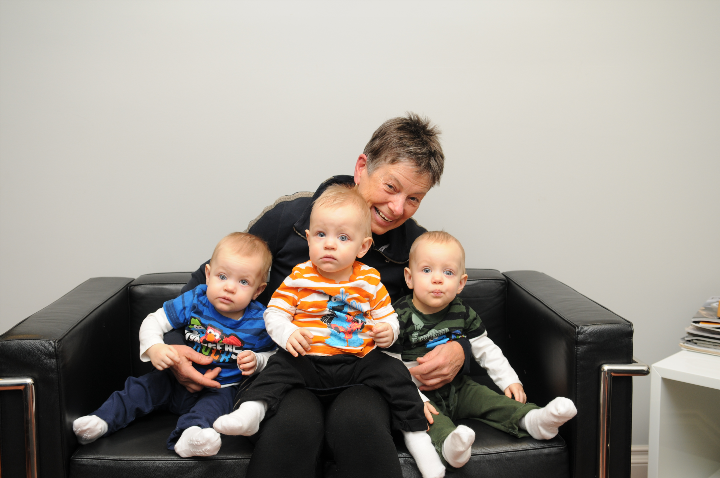The odds of having identical triplets are very low. The odds of having identical triplets with a rare childhood eye cancer are nearly non-existent.
Yet this is the situation Alberta residents Leslie and Richard Low found themselves in when their two-month old sons Thomas, Luke, and Mason, were diagnosed with retinoblastoma (RB) in February 2014.
Immediately after the boys were diagnosed, the Lows were referred to world-renown, Terry Fox-funded retinoblastoma specialists Drs. Brenda Gallie and Helen Chan in Toronto.
Both specialists have been Terry Fox-funded researchers for decades, and their groundbreaking research in retinoblastoma, including establishing best practice protocols, have helped bring Canada’s retinoblastoma mortality rate down to just one per cent. Nearly 8,000 children are diagnosed each year worldwide — 70 per cent do not survive.
The family traveled between Alberta and Toronto for treatment and within eight months each of the triplets had one eye removed. Now almost 18 months old, Thomas, Luke, and Mason all have one healthy eye and one matched blue prosthetic.
“We’re at a very hopeful stage, and we feel like the worst is past us,” says their mother Leslie Low, 28. “We know what a blessing and a miracle it is that they each had one good eye to start off with. It is really pretty incredible.”
“Each of the Low triplets had more than one tumour, but we’ve caught them when the tumours were very tiny and treated them successfully with only laser surgery, and sometimes freezing,” says Dr. Gallie. “The boys are beautiful and they will do well with their remaining eye.”
Low says both doctors were “incredible”, presenting them with the best information and most-advanced treatment options.
“They helped us avoid the emotional aspect of it — I find sometimes that’s really, really hard as a parent to do,” says Low. “They helped us make the best decisions for our children.”
Retinoblastoma is thought to be genetic, but the Lows have no family history of the disease. Their oldest son Benson, 4, does not have the RB mutation. Children with retinoblastoma have a 50 per cent chance of passing on the gene to their children and have a higher risk of developing other cancers.
Dr. Chan, program leader of the Terry Fox Translational Project in retinoblastoma, adds “I think that it is very important that TFRI and the Terry Fox Foundation have funded a rare cancer. Retinoblastoma is a children’s cancer rather than an adult cancer and is ranked number 13 in pediatric cancers. The RB mutation itself is a tumour suppressor gene and affects a lot of other cancers.
“I really value seeing the patients as they grow older, when they can discuss things with you. Remembering seeing my patients as babies and seeing them grown up and eager to learn about the disease, [as a physician] I find that extremely gratifying.”
The Low family is grateful for the research that has helped the triplets, “We are so thankful to all those who donate to research and who do things to try and help research to be done for cancer,” says Low. “It’s such a huge thing for us and we are so grateful for that. This is going to impact us forever.”
